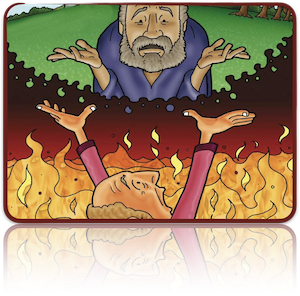
After listening to today’s Gospel reading, what kind of reaction do we feel in our hearts? Do we experience confusion about material wealth—something we inevitably desire, yet which may corrupt our hearts? Such was the experience of the rich person in the parable. Or do we feel empathy toward Lazarus, yet feel sadness because we wish to avoid becoming poor like him?

First, we must clarify that the parable does not condemn wealth itself. We need to earn a living and receive just wages for our work. The issue arises when we become too attached to material wealth to the point that it robs our hearts of hope. Additionally, through the story of Lazarus, the parable does not romanticize poverty. Instead, it reveals the unjust structures in society that create a gap between Lazarus and the rich man. The parable, through Lazarus, highlights the need to bridge that gap within our society.
Let us focus on an important detail: even in hell, the wealthy man still thinks only of himself and his possessions. He attempted to treat Lazarus as if he were still beneath him, seeking Lazarus out for services. He did not recognize the profound separation between himself in hell and Lazarus in heaven. In an ironic twist, the social gap he created in life followed him into the afterlife. He exclaimed, “Please bring me water to quench my thirst,” or “Please warn my relatives who are still alive.” These commands indicate that he still believed he was superior to Lazarus. The social divide he created during his life persisted in his heart, even after death. The hearts we nurture with hope through caring for others in this life will be the same hearts we bring to the afterlife. The rich man’s heart was filled with material wealth but deficient in hope.
Today marks the World Day of Migrants and Refugees. Pope Leo XIV, in his message for this day, said, “In a world darkened by war and injustice, even when all seems lost, migrants and refugees stand as messengers of hope. Their courage and tenacity testify to a faith that sees beyond what our eyes can see and gives them the strength to defy death on the various contemporary migration routes.” Migrants and refugees are people of hope. They embody a true hope that arises from surrendering to God. Can we view them as beacons of hope instead of merely as social problems to be solved? Can we see them as an invitation to care and nurture our own hope as Christians?
We often hear the phrase, “Sharing is Caring.” However, it’s important to recognize that both “sharing” and “caring” are integral to this statement. While “sharing” manifests as an expression of “caring,” it must come from a heart that genuinely cares. “Sharing” is more than a cultural or communal action; it means nothing if it stems from someone with superiority who looks down on others. True sharing is an act of hope rooted in our hearts. Unlike the rich man in today’s Gospel parable, who lost hope and created an eternal gap between himself and others, we are encouraged through the second reading to pursue the values that nurture hope in our hearts: righteousness, devotion, faith, love, patience, and gentleness. Ultimately, the parable presents us with not just a spiritual question but an existential one: can we bridge the social gaps in this world by embracing hope among the poor, migrants, and refugees? Lazarus still exists in our world today. By caring for them, we can cultivate hope in our hearts.h hope.
by Fr. Antonius Firmansyah, SJ

